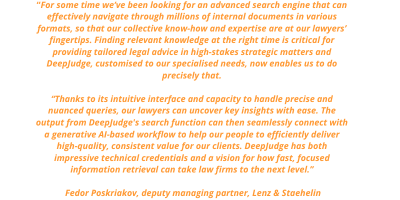Swiss-founded legal tech startup DeepJudge has raised $10.7m in an oversubscribed seed funding round led by New York private equity firm Coatue. Additionally, the company today (18 June) announced the availability of DeepJudgeKnowledge Assistant, a generative AI interface for law firms and legal departments to access their document knowledge base.
Founded by AI researchers and former Google search engineers Paulina Grnarova, Yannic Kilcher, and Kevin Roth, DeepJudge enables organisations to retrieve relevant content from across the enterprise, including document management systems and the Microsoft 365 ecosystem. It integrates with Copilot, extending its permissions-aware retrieval system across a firm’s internal data.
DeepJudge’s knowledge search is powered by the company’s proprietary Colinear Technology, which blends the capabilities of semantic and keyword search. It uses a proprietary large language model to understand the content within each document regardless of document type and enables legal professionals to search in their own words.
Its new Knowledge Assistant uses Retrieval-Augmented Generation (RAG) technology to surface the most relevant, up-to-date information, with answers that are grounded in an organisation’s institutional knowledge.
“Over time, law firms generate millions of documents, forming a vast reservoir of intellectual output. Yet, when tackling new tasks, lawyers often have to start from scratch, struggle to locate colleagues with relevant expertise, or spend hours crafting complex Boolean queries,” said Paulina Grnarova, CEO of DeepJudge.
“This is where DeepJudge steps in. Our mission is to connect legal professionals with their entire collective knowledge in an intuitive manner, turning it into a powerful competitive advantage. AI-powered search not only boosts productivity, but also unlocks entirely new possibilities for firms and legal departments, such as spotting risks and opportunities from across their client base. It can make legal teams instantly smarter about advising clients on industry trends.”


The funding will be used to develop the product and scale the commercial team. Grnarova told Legal IT Insider: “Our ultimate mission is to connect people in large organizations to the entirety of their internal knowledge. We have found very warm welcomes when deploying our document search engine into companies. However, document search is only one aspect of internal knowledge, so we are definitely looking to expand that. On the other hand, we know that we can deliver a lot more value to our customers, given the unique connection that we already have to their internal data. So in short, the money will be used towards further development of the product, as well as scaling the team on the commercial side to support increasing customer demands.”
DeepJudge has already been growing. In February it announced that Tony Ensinger, previously head of sales at Casetext (acquired by Thomson Reuters), joined as their SVP of sales and product strategy. Additionally, Steve Obenski, former senior leader at Kira Systems (acquired by Litera), has joined DeepJudge as an interim chief strategy officer to help spearhead the US expansion. The company’s advisors include Jan Puzicha, one of the founders of Recommind (acquired by OpenText).
We asked Grnarova what the team’s biggest learning of the past year has been and what the legal market is wrong about when it comes to generative AI.
With regard to learning, she said: “Users are in general very competent at making complex decisions about the relevance and context of presented data. This led us to improve the way we present search results – giving users all the necessary extra information needed to make such judgements.”
As to what the market is wrong about, she says: “The market is too focused on the expectation that GenAI should perform end-to-end tasks that today are done by highly trained professionals and require multiple steps of abstract reasoning. We believe a better way of utilizing GenAI is as an enabling technology, working alongside and together with the human to solve these problems.”

